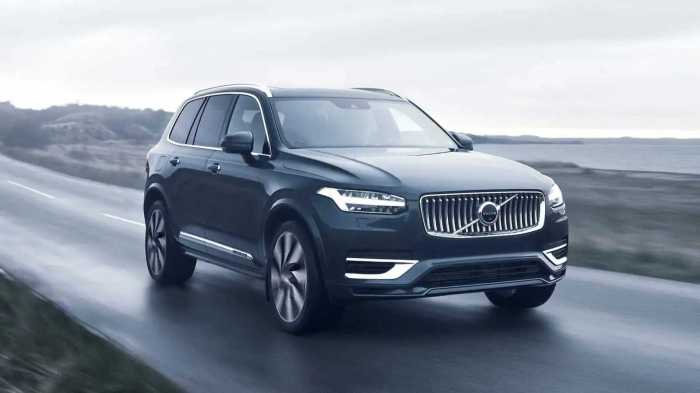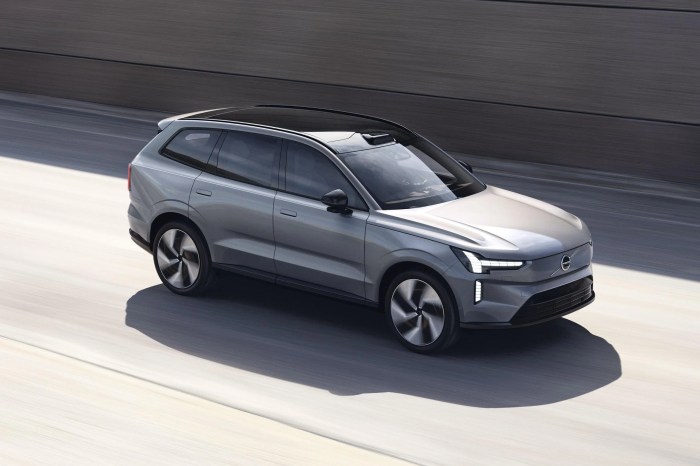Top rated electric SUVs are rapidly gaining traction among consumers, combining eco-friendliness with modern convenience. As governments push for sustainability and individuals seek greener alternatives, electric SUVs have emerged as a popular choice for families and adventurers alike. With their impressive features and reduced carbon footprints, these vehicles not only offer an appealing driving experience but also align with a more sustainable future.
This growing interest is fueled by consumers’ desire for advanced technology, enhanced performance, and greater range, making it essential to explore the best options currently available. As we dive into the world of electric SUVs, we’ll uncover what sets them apart, from their innovative features to their impact on the environment.
Introduction to Electric SUVs: Top Rated Electric SUVs
Electric SUVs have experienced a remarkable surge in popularity over the past few years, capturing the attention of consumers who are increasingly aware of the environmental impacts of their vehicle choices. As traditional fuel sources become less sustainable, electric SUVs offer a cleaner alternative, reducing dependence on fossil fuels and lowering greenhouse gas emissions. The appeal of these vehicles lies not only in their eco-friendliness but also in their impressive performance, spacious interiors, and cutting-edge technology that cater to the modern driver’s needs.
When considering a top-rated electric SUV, consumers often look for key features such as battery range, charging speed, advanced safety systems, and integrated infotainment technology. These elements not only enhance the driving experience but also ensure that the vehicle meets the practical demands of daily use.
Current Top Rated Electric SUVs

The market for electric SUVs is thriving, with numerous models offering a blend of performance, range, and features. Below is a list of some of the current top-rated electric SUVs available:
- Tesla Model Y
- Range: Up to 326 miles
- 0-60 mph: 3.5 seconds
- Key Features: Autopilot, spacious cargo, a high-tech interior
- Ford Mustang Mach-E
- Range: Up to 300 miles
- 0-60 mph: 3.5 seconds
- Key Features: Ford Co-Pilot360, customizable interior, fast charging
- Volkswagen ID.4
- Range: Up to 250 miles
- 0-60 mph: 7.5 seconds
- Key Features: Ample passenger space, intuitive infotainment, and a solid warranty
- Hyundai Ioniq 5
- Range: Up to 303 miles
- 0-60 mph: 5.0 seconds
- Key Features: Ultra-fast charging, spacious interior, and advanced safety tech
- Nissan Ariya
- Range: Up to 300 miles
- 0-60 mph: 5.1 seconds
- Key Features: Dual motor option, ProPILOT Assist, and a sleek design
These models exemplify the advancements in technology and performance that define today’s electric SUVs, making them an attractive option for both new and seasoned buyers.
Performance and Handling
Performance metrics play a crucial role in defining the driving experience of electric SUVs. These vehicles typically boast impressive acceleration capabilities, with many models achieving 0-60 mph in under five seconds, which rivals high-performance gasoline counterparts. For instance, the Tesla Model Y and Ford Mustang Mach-E are notable for their sporty acceleration and responsive handling.
Additionally, electric SUVs are engineered with a low center of gravity due to the placement of their batteries, enhancing stability and control in various driving conditions. Whether navigating city streets or tackling winding roads, these vehicles offer a smooth and engaging ride, elevating driver confidence.
Technology and Infotainment Features

Modern electric SUVs are equipped with advanced technology that enhances both safety and convenience. Key technology features commonly found in these vehicles include:
- Advanced Driver Assistance Systems (ADAS): Many electric SUVs come with adaptive cruise control, lane-keeping assist, and automated emergency braking.
- Infotainment Systems: Vehicles like the Hyundai Ioniq 5 offer large touchscreens, smartphone integration, and voice recognition technology, ensuring that drivers stay connected while on the road.
- Over-the-Air Updates: Brands such as Tesla lead the industry by providing over-the-air software updates, improving vehicle performance and adding new features without a service visit.
The integration of these technologies not only improves the overall driving experience but also enhances safety and connectivity for drivers.
Charging Infrastructure and Range
The availability of charging infrastructure is vital for potential electric SUV buyers. Different charging options exist, including:
- Level 1 Charging: This method uses a standard household outlet, ideal for overnight charging.
- Level 2 Charging: Common in public charging stations and homes, Level 2 charging offers a faster alternative, capable of charging an SUV in a few hours.
- DC Fast Charging: Available at select stations, this option enables rapid charging, providing significant range in a short amount of time.
For consumers, understanding the importance of charging infrastructure cannot be overstated. The charging time varies among models, with some vehicles capable of charging from 10% to 80% in around 30 minutes using DC fast charging stations, making long-distance travel feasible and convenient.
Cost and Incentives
The price range for top-rated electric SUVs varies significantly, with options available from more affordable models to luxury variants. For instance, the Ford Mustang Mach-E starts at around $43,000, while high-end models like the Tesla Model Y can exceed $60,000.
Government incentives and rebates can provide substantial savings, with many regions offering tax credits that can reduce the cost of purchasing an electric vehicle. These incentives, combined with lower operating costs due to reduced maintenance and fuel expenses, contribute to a lower total cost of ownership compared to gasoline SUVs.
Environmental Impact and Sustainability

The long-term environmental benefits of electric SUVs are significant. Transitioning from gasoline to electric vehicles leads to a reduction in carbon emissions, contributing to cleaner air and a healthier planet. Manufacturers producing electric SUVs emphasize sustainability by employing eco-friendly materials and practices in the production process.
Statistics show that widespread adoption of electric vehicles could lead to a significant decrease in overall emissions. For example, the International Energy Agency estimates that electric vehicle adoption could reduce global CO2 emissions by as much as 1.5 billion tons by 2030.
User Reviews and Ratings, Top rated electric SUVs
User reviews and ratings provide valuable insights into the experiences of electric SUV owners. Common themes highlighted in these reviews often include satisfaction with the vehicle’s performance, range, and technology features. Many users appreciate the smooth driving experience and the quietness of electric powertrains.
Feedback from consumers can significantly influence potential buyers’ decisions. Positive reviews can build confidence in a specific model, while negative experiences may deter prospective buyers.
Future Trends in Electric SUVs
Emerging technologies are set to shape the future of electric SUVs. Innovations such as improved battery technology, including solid-state batteries, promise longer ranges and shorter charging times. Additionally, advancements in autonomous driving technology may redefine how electric SUVs are used and perceived.
Market shifts are also expected, as more consumers prioritize sustainability and efficiency in their vehicle choices. As charging infrastructure continues to expand and new models are introduced, electric SUVs will likely become an increasingly dominant segment in the automotive market, driven by evolving consumer preferences and a commitment to reducing carbon footprints.
Outcome Summary
In conclusion, the top rated electric SUVs represent a significant advancement in automotive technology, offering exceptional performance, state-of-the-art features, and a commitment to sustainability. As we look ahead, the ongoing evolution of these vehicles promises to make them even more desirable for future drivers. Embracing electric SUVs not only supports a cleaner environment but also paves the way for a new era of driving innovation and efficiency.